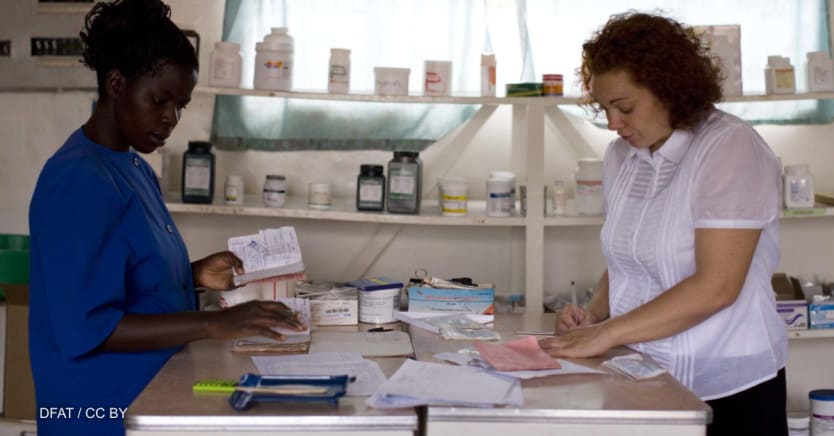
Self-care is not a universally well understood concept. The self-care community adopts the World Health Organization’s definition of self-care as “the ability of individuals, families, and communities to promote health, prevent disease, maintain health, and to cope with illness and disability with or without the support of a health care provider.”
However, we know from our daily practice and from conversations with our International Pharmaceutical Federation, or FIP, members, and the broader network, that the notion of self-care is multifaceted and multidimensional, involving a broader set of stakeholders and subject to cultural influences.
Self-care belongs to a continuum that involves individuals, families, communities, health care professionals, and policymakers at different levels and with different responsibilities. Individuals cannot — and should not be expected to — optimally embrace self-care practices and behaviors without the support of policymakers and health care providers. Just as patients and consumers will need to adopt self-care practices in order to take greater responsibility for their health, policymakers and health care providers will need to commit to developing and providing those tools and opportunities for health literacy education.
To that end, support and trust among all stakeholders — health care providers, patients and consumers, and regulators and policymakers — are essential to maximizing the adoption of self-care behaviors, regardless of what self-care means in various geographies.
This gap between consumers’ desire to practice self-care and their functional ability to do so can be addressed through policymaker and health care provider action.
—At FIP, the COVID-19 pandemic has highlighted an opportunity to elevate and deepen the conversation on self-care, to better equip clinicians and policymakers alike with the knowledge they need to leverage self-care as a tool for empowering patients, improving health outcomes, and reducing health system costs. And, as pharmacists, we are aware of our responsibility as health care providers to support self-care, along with its critical prerequisites, such as patient and consumer empowerment, and health literacy.
We know that 90% of individuals see self-care as central to the prevention and treatment of both minor complaints and chronic conditions. Unfortunately, only 2 out of 10 report feeling “very confident” in managing their own health. That is, while consumers trust and value self-care in theory, they are less confident about adopting self-care products and behaviors in practice.
The first-ever Self-Care Readiness Index is an advocacy-centered research initiative spearheaded by the Global Self-Care Federation in collaboration with the WHO. The index identifies and discusses the critical enablers for self-care readiness in a health system, and uses an evaluation of those enablers to measure the self-care readiness of a diverse set of 10 countries, highlighting existing progress and identifying common areas for improvement.
The index aspires to illuminate self-care’s role in the care continuum and identifies opportunities for consumers, patients, and health care professionals to rip the benefits of self-care for improving well-being, and supports policymakers and regulators in integrating self-care into health policy decision-making.
This gap between consumers’ desire to practice self-care and their functional ability to do so can be addressed through policymaker and health care provider action. After all, self-care has the potential to help solve some of the world’s most pressing macro-public health challenges, including the pursuit of universal health coverage, the prevention and management of chronic conditions, and the provision of high-quality care for fast-growing aging populations.
I was thrilled to participate as a member of an expert advisory committee of the soon-to-be-launched Self-Care Readiness Index.
Launching in September 2021, the index will fully examine the role of policymakers, health care providers, and consumers in supporting a vibrant self-care ecosystem.
Policymakers play a critical role: in order for self-care to be embedded in a society, it must be institutionalized via direct changes to public policy advancing self-care programs. Consumers and health care providers both have a symbiotic role to play in the self-care ecosystem — consumers need health care provider support to feel confident in adopting self-care behaviors, and health care providers need consumers to adopt self-care behaviors to reap the maximum benefits of health promotion and chronic disease treatment plans.
A 2019 study well described the need for change and confirmed what we have heard over and over again from our pharmacist members: Consumers’ lack of knowledge about health issues and worries about mistakes are two of the key barriers to the self-management of minor ailments.
As a global association serving clinicians, FIP wants to change this narrative. We know that health care providers want to be supportive of self-care. We also believe that health systems and medical associations have a responsibility to patients and providers to put forward educational resources on self-care. If clinicians are not comfortable making self-care recommendations or coaching patients on self-care practices and products, patients and consumers are much less likely to adopt those beneficial behaviors.
Patients and consumers look to trusted clinician partners — oftentimes their primary care provider or pharmacist — for guidance on self-care products
Pharmacists play a front-line role in empowering people for responsible self-care at the community level, interacting daily with patients and consumers making decisions about self-care products and behaviors in pharmacies around the world.
Below is the specific role pharmacists have in supporting self-care, which FIP based on WHO's definition of the role. FIP has built on these noting evidence of outcomes is collected for all:
• As health promoters, pharmacists participate in health promotion campaigns to raise community awareness of health issues and disease prevention and provide advice to individuals to help them make informed health choices.
• As collaborators, pharmacists link into health systems and community care teams.
• As communicators, pharmacists ask key questions to patients and start a dialogue on medical history in order to provide objective and evidence-based advice about self-medication.
• As coaches, pharmacists adopt methodologies to support health literacy and social prescribing.
• As prescribers, pharmacists ensure the safe prescription of medicines and counter prescribing.
• As quality suppliers of products, diagnostics, and vaccinations, pharmacists source and properly store quality health products to ensure consumer safety.
At FIP, we are committed to ensuring that pharmacists stand ready and equipped to offer that guidance on self-care.
With the launch of the index in September and the launch of a toolkit in November to support pharmacists in supporting responsible self-care choices, we look forward to continuing this important conversation.
To find out more, watch Shaping the future of self-care, through pharmacy.








